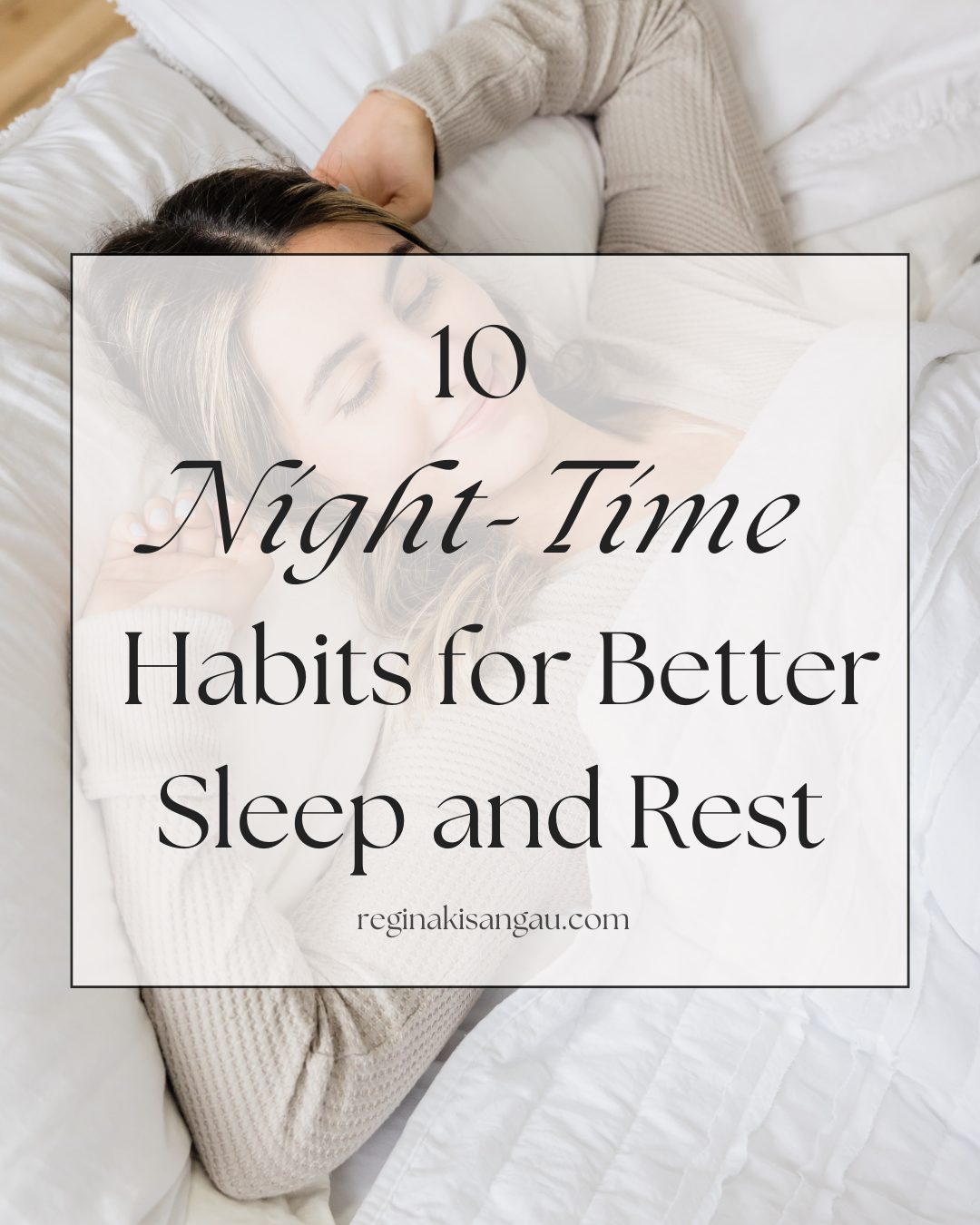This post may contain affiliate links. If you purchase through my links, I may earn a commission, at no extra cost to you.
If you’re tired of feeling, well, tired… you’re not alone. So many of us go to bed exhausted but still struggle to fall asleep, stay asleep, or feel rested the next day.
The good news? A few small changes in your nightly routine can make a big difference. These night-time habits for better sleep are easy to start, super doable, and help you wind down in a way that sets you up for quality rest.
Let’s dive in and build a sleep-friendly routine that actually works.
1. Set a Consistent Bedtime
Your body loves routine, even if your schedule doesn’t. Going to bed and waking up around the same time every day (yes, even on weekends) helps reset your internal clock and makes falling asleep easier over time.
It’s like training your body to expect rest at a certain time; it just makes sleep feel more natural.
If your current sleep schedule is all over the place, try adjusting it in small steps, like 15–30 minutes earlier or later each night until you hit your ideal bedtime.
2. Create a Night-Time Routine
Jumping straight from TikTok to trying to fall asleep just doesn’t cut it. Your brain needs time to shift gears.
A night-time routine can be as simple as dimming the lights, doing your skincare, maybe reading a book or journaling for 10 minutes. It tells your body that you’re done for the day and ready to rest.
Creating a calming vibe before bed really helps your mind and body relax.
3. Limit Screen Time Before Bed
We all love a good scroll, but screens (especially phones and tablets) give off blue light that messes with melatonin, the hormone that helps you sleep.
If you’re watching Netflix or stuck on your phone until the moment you crash, it might be time to set a tech curfew.
Try turning off screens at least 30 minutes before bed and doing something else instead, like stretching, listening to music, or reading a chapter or two.
4. Cut Off Caffeine Late in the Day
Love coffee? Same. But if you’re sipping it past 3 pm, it might still be in your system come bedtime. Caffeine can hang out in your body for hours and quietly sabotage your sleep.
Swap your late-day coffee or soda for something more relaxing, like herbal tea (chamomile or peppermint are great) or even just warm lemon water. Your future sleepy self will thank you.
5. Keep Your Bedroom Cool and Cozy
Your sleep environment matters more than you’d think. A cooler room is ideal for better sleep.
Add in soft sheets, a cozy comforter, and maybe a sound machine or blackout curtains, and you’ve got a sleep haven.
The goal is to turn your bedroom into a place your body associates with rest and nothing else. That alone can help improve your sleep quality.
6. Try Relaxation Techniques
If your brain won’t stop spinning at night, try giving it something calming to focus on.
Deep breathing, meditation, or muscle relaxation can make a huge difference.
Even a short 5-minute practice can help you shift from wired to restful. There are lots of free apps and YouTube videos with guided sleep meditations, if you’re not sure where to start.
7. Avoid Heavy Meals Before Bed
Late-night pizza might sound like a dream, but your stomach might not agree.
Eating heavy or spicy meals close to bedtime can keep you up with indigestion or just make it harder to fall asleep comfortably.
If you’re truly hungry, go for something light like yogurt, a banana, or a handful of almonds. A small snack won’t mess with your sleep the way a full meal might.
8. Write Down Worries or To-Do Lists
Ever lay down and suddenly remember everything you forgot to do that day? Or have to do tomorrow? Yeah.
Instead of trying to keep it all in your head, write it down. A simple brain dump or quick to-do list helps clear mental clutter.
You can even keep a notebook on your nightstand for those random 11 pm thoughts. It’s a great way to relax your mind and feel more in control.
9. Limit Naps During the Day
We love a good nap, but long or late-afternoon naps can throw off your night-time routine.
If you’re going to nap, try to keep it under 30 minutes and before 3 pm.
It helps your body build up the right amount of sleepiness by bedtime, which means you’re more likely to drift off naturally at night.
10. Use Soothing Scents or Sounds
Setting the mood for sleep doesn’t have to be complicated. A little lavender essential oil, a calming playlist, or even rain sounds can create the perfect atmosphere to unwind.
These small rituals might seem simple, but they really help signal to your brain that it’s time to rest.
A relaxing bedtime routine with scents or sounds makes sleep feel more inviting and natural.
There you go! 10 night-time habits for better sleep that are simple, realistic, and can actually help you feel more rested. You don’t need to overhaul your entire life to sleep better. Just pick one or two habits that feel doable and build from there.
Which one are you going to try tonight? Sweet dreams!
YOU MIGHT ALSO LIKE: Journaling for Beginners: A Guide to Personal Growth and Self-Reflection
Pin it!





Leave a Reply